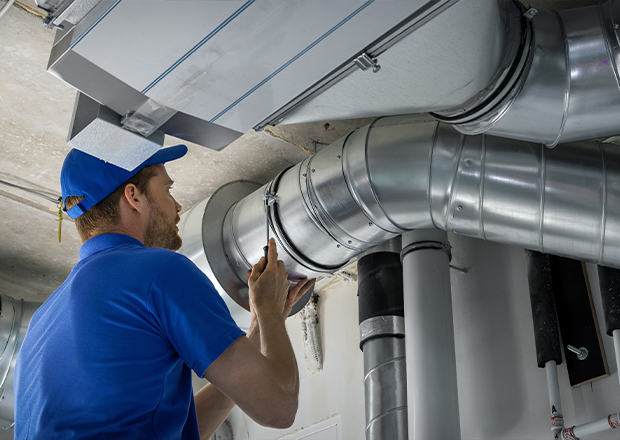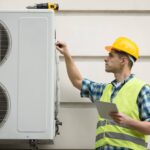We will explore the significance of proper ventilation in commercial HVAC installation. Ventilation plays a crucial role in maintaining air quality, temperature control, and the overall health of a building’s occupants. Whether you’re managing a small office or a large commercial space, the importance of a well-designed ventilation system cannot be overstated. Not only does it ensure that indoor air is fresh and free from contaminants, but it also promotes energy efficiency and enhances the performance of heating and cooling systems. We will examine why proper ventilation should be a priority when installing an HVAC system in any Hamel commercial setting, focusing on its impact on air quality, energy savings, and the well-being of building occupants.
Enhancing Indoor Air Quality
One of the primary functions of ventilation in a commercial HVAC system is to improve indoor air quality. Proper airflow helps remove pollutants such as carbon dioxide, volatile organic compounds (VOCs), dust, and mold spores, which can accumulate in indoor spaces over time. Without adequate ventilation, these pollutants can negatively affect the health and productivity of employees, customers, or tenants. Poor air quality has been linked to respiratory issues, headaches, fatigue, and even long-term conditions like asthma. A well-designed ventilation system ensures fresh outdoor air while expelling stale indoor air. This process helps maintain a healthier, more comfortable indoor environment. Moreover, proper ventilation can prevent the buildup of humidity, which can foster the growth of mold and mildew, leading to structural damage and further health concerns.
Energy Efficiency and Cost Savings
Proper ventilation plays a vital role in the energy efficiency of a commercial HVAC system. When ventilation is not optimized, the HVAC system must work harder to maintain the desired indoor temperature, resulting in higher energy consumption. An efficient ventilation system helps balance the fresh air brought into the building and the cooling or heating requirements. In turn, this reduces the workload on the HVAC system and minimizes energy costs. By utilizing energy recovery ventilators (ERVs) or heat recovery ventilators (HRVs), businesses can recover energy from exhaust air to precondition incoming fresh air, further enhancing energy savings. As energy costs continue to rise, implementing an efficient ventilation system during HVAC installation can lead to long-term financial benefits, reducing utility bills and helping the environment by minimizing the building’s carbon footprint.
Regulatory Compliance and Building Codes
In many commercial settings, proper ventilation is not just a matter of comfort or energy savings but is also required by building codes and regulations. Various local, state, and federal regulations govern indoor air quality and ventilation standards to ensure the health and safety of building occupants. For example, the American Society of Heating, Refrigerating, and Air-Conditioning Engineers (ASHRAE) provides guidelines that dictate the minimum ventilation required for different commercial spaces. Failing to meet these standards during HVAC installation can result in fines, legal complications, and health risks. Additionally, if a building undergoes inspection or certification (such as LEED certification), maintaining proper ventilation is crucial for meeting the criteria. Commercial building owners and managers must prioritize ventilation during HVAC installation to comply with these regulations, ensuring the safety of their employees and visitors.
Comfort and Productivity
Proper ventilation in a commercial space directly affects the comfort of its occupants. The indoor environment can feel stuffy or uncomfortable without sufficient airflow, leading to dissatisfaction and decreased productivity. In office spaces, for instance, poor ventilation can contribute to “sick building syndrome,” where employees experience symptoms like headaches, dizziness, and eye irritation, leading to increased absenteeism. Proper ventilation helps maintain a consistent indoor temperature, preventing hot or cold spots that may disrupt work and cause discomfort. A well-designed HVAC system can provide a comfortable environment conducive to focus and productivity by ensuring that air is evenly distributed throughout the building. This is especially important in commercial settings where employees are expected to perform tasks for extended periods. Creating a comfortable and healthy atmosphere through proper ventilation can help improve morale, reduce sick days, and boost overall performance.
Preventing Overburdening the HVAC System
When ventilation is not properly considered during HVAC installation, the system can become overburdened. Insufficient airflow can make it more difficult for the HVAC system to regulate temperature and humidity, forcing it to run longer and harder to achieve the desired indoor conditions. This reduces the HVAC system’s lifespan, leading to more frequent repairs and maintenance. Businesses can ensure the system operates efficiently without strain by prioritizing ventilation in the design and installation phases. A well-ventilated space allows for optimal airflow, ensuring the HVAC system can function effectively without overload. This ultimately leads to fewer system breakdowns, lower maintenance costs, and a longer lifespan for the HVAC equipment.
The importance of proper ventilation in commercial HVAC installation cannot be overlooked. It impacts everything from indoor air quality to energy efficiency, comfort, and legal compliance. A well-ventilated building promotes a healthier, more comfortable environment for occupants while reducing energy costs and the strain on the HVAC system. As air quality and energy consumption regulations evolve, prioritizing proper ventilation during HVAC installation will become increasingly essential for businesses looking to maintain a competitive edge. By investing in an efficient ventilation system, businesses can ensure their employees’ and visitors’ health and well-being while enhancing their building’s overall performance and longevity.







